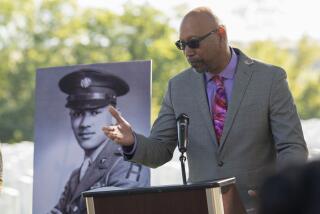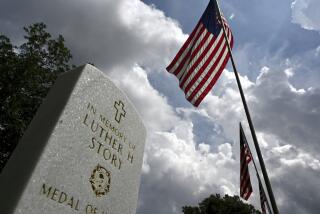Jack Montgomery, 84; WWII Hero Won Medal of Honor
- Share via
Jack C. Montgomery, a World War II Medal of Honor recipient whose single-handed attack on three strongly defended enemy positions accounted for 11 dead and 32 prisoners during the Battle of Anzio, has died. He was 84.
Montgomery, who had been on dialysis, died June 11 in Muskogee, Okla.
A veteran of Oklahoma’s 45th Infantry Division, Montgomery first experienced combat as a platoon sergeant in Sicily in the summer of 1943. He received a battlefield commission as a 2nd lieutenant shortly before participating in the invasion of the Italian mainland at Salerno, after which he earned a Silver Star.
On the morning of Feb. 22, 1944, Montgomery had been fighting nearly seven straight months and was a 1st lieutenant commanding a rifle platoon near Padiglione, Italy.
Two hours before daybreak, according to his Medal of Honor citation, a strong force of German infantry established itself in three echelons in front of Montgomery’s platoon. The nearest enemy position--four machine guns and one mortar only 50 yards away--posed the most immediate threat to Montgomery and his men.
Armed with his M1 rifle and several hand grenades, Montgomery left his platoon behind a stone wall and crawled up a shallow ditch to within hand grenade-throwing range of the enemy. He then climbed atop a small mound and, after firing his rifle, threw his grenades. He killed eight of the enemy soldiers and captured the remaining four.
After returning to his platoon, Montgomery called for artillery on a house about 300 yards away, in and around which he suspected most of the enemy were entrenched. Armed with a carbine, he then crawled up the ditch to the second enemy position 100 yards away.
Despite facing heavy fire, the citation reads, “he attacked this position with such fury that seven of the enemy surrendered to him, and both machine guns were silenced.” Later that morning, three enemy dead were found in the area.
It was daylight when Montgomery continued moving toward the German-held house. After the artillery barrage ended, the citation reads, he “ran fearlessly toward the strongly defended position. As the enemy started streaming out of the house, 1st Lt. Montgomery, unafraid of treacherous snipers, exposed himself daringly to assemble the surrendering enemy and send them to the rear.”
As a result of Montgomery’s “fearless, aggressive and intrepid actions that morning,” 11 enemy soldiers were killed, 32 were taken prisoner and an unknown number were wounded.
That night, while helping an adjacent unit repulse a counterattack, Montgomery was hit by mortar fragments and badly wounded. In January 1945, after spending months in the hospital, he was ordered to Washington, where President Franklin D. Roosevelt presented him with the nation’s highest military honor.
“I was just doing the job I was supposed to be doing,” Montgomery said years later. “It just happened that I got lucky.”
Jack Cleveland Montgomery was born near Long, Okla., on July 23, 1917, and grew up on a farm. Montgomery, whose mother was Cherokee, attended Bacone Junior College in Muskogee, which had been founded to educate Indians when Oklahoma was still Indian territory.
While in college, where he became a star running back, Montgomery enlisted in Company I, 180th Infantry of the 45th Division of the Oklahoma National Guard. The integrated division, whose symbol was a Thunderbird, consisted of Indians from more than 50 tribes.
He left the division after receiving a scholarship to the University of Redlands in California, where he earned a physical education degree.
He returned to Oklahoma just as the 45th Division was being mobilized and reenlisted. After serving the required year, Montgomery was discharged as a sergeant in September 1941.
But after the attack on Pearl Harbor three months later, he again reenlisted. (Eight members of the 45th Division received Medals of Honor during World War II.)
After the war, Montgomery worked for the Veterans Administration in Muskogee and in surrounding towns.
He is survived by his wife, Joyce, and three sisters: Syble Claymore of Marksville, S.D., Hazel Johnson of Chickasha, Okla., and Okemah Arey of Tulsa.
More to Read
Sign up for Essential California
The most important California stories and recommendations in your inbox every morning.
You may occasionally receive promotional content from the Los Angeles Times.













